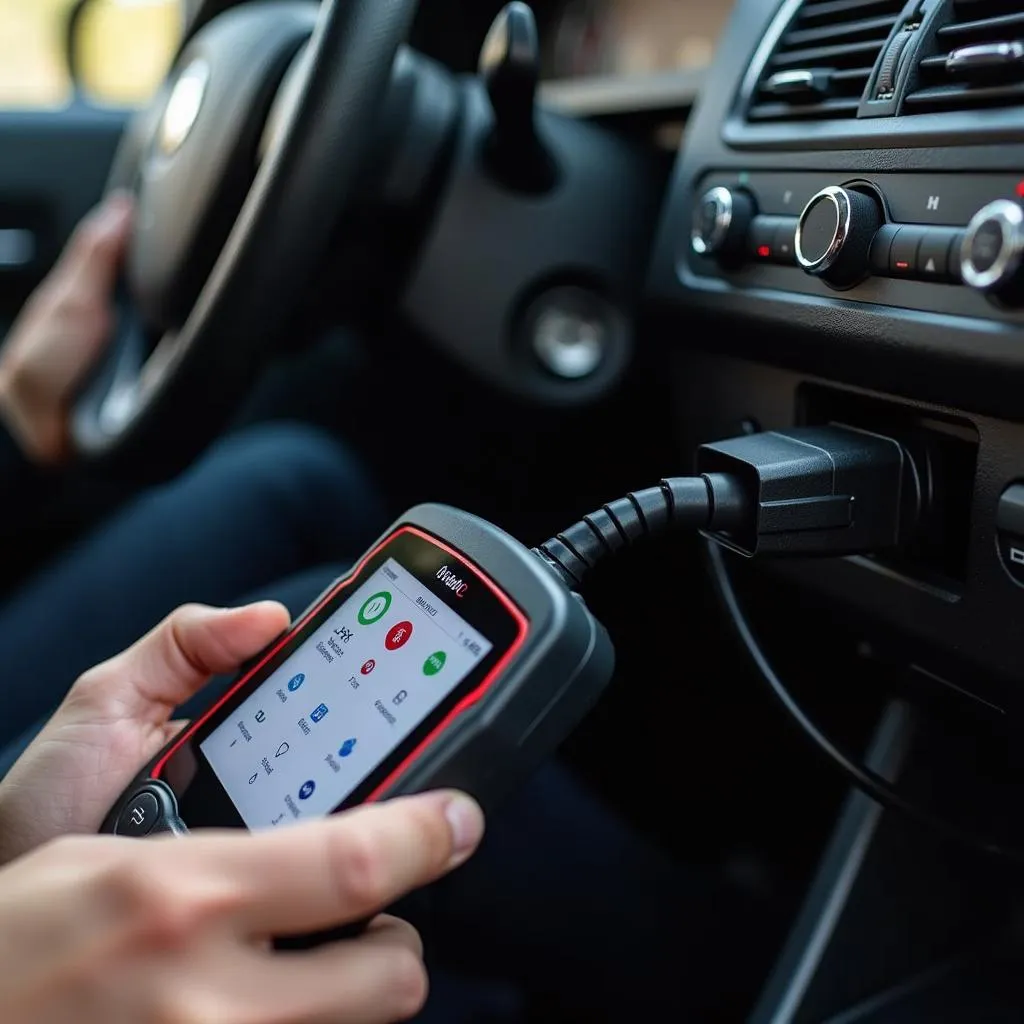One of the most common concerns car owners have about OBD2 scanners, especially the plug-and-play variety, is whether they drain the car battery. After all, these handy devices provide a wealth of information about your vehicle’s health by plugging directly into your car’s computer system. But does accessing this information come at the cost of your battery life?
In most cases, the answer is a resounding no. A properly functioning OBD2 scanner uses a negligible amount of power, even when plugged in for extended periods. However, certain situations might lead to battery drain, and it’s essential to understand them to prevent unexpected surprises.
How OBD2 Scanners Work and Their Power Consumption
OBD2 scanners work by communicating with your car’s Engine Control Unit (ECU). They tap into the vehicle’s electrical system to access data from various sensors, but the power draw is minimal. Think of it like a small LED light bulb – it uses electricity but won’t drain your battery quickly.
Factors that Could Lead to Battery Drain
While OBD2 scanners themselves are unlikely to drain your car battery, there are a few related factors that could be the culprit:
1. Leaving the Scanner Plugged In for Extended Periods
While the scanner itself draws minimal power, leaving it plugged in for days or even weeks can slowly drain your battery. This is especially true for older vehicles with less robust batteries.
2. Faulty OBD2 Scanner
Like any electronic device, OBD2 scanners can malfunction. A faulty scanner might draw more power than necessary, leading to battery drain. Always purchase scanners from reputable brands and check for any signs of damage or malfunction.
3. Underlying Battery Issues
Sometimes, the issue isn’t the scanner but your car battery itself. An old, weak, or dying battery is more susceptible to drain, regardless of whether you use an OBD2 scanner.
Preventing OBD2 Scanner-Related Battery Drain
Here are some simple tips to prevent potential battery drain issues when using an OBD2 scanner:
- Unplug After Use: Make it a habit to unplug your OBD2 scanner after each use. Just like you wouldn’t leave your phone charger plugged in unnecessarily, treat your scanner the same way.
- Turn Off Your Car: When using an OBD2 scanner, it’s best to turn off your car’s engine. This minimizes any potential power draw and protects both your scanner and vehicle’s electrical system.
- Maintain Your Battery: Regularly check your car battery’s health. If it’s old or showing signs of weakness, consider replacing it to avoid unexpected issues.
- Buy Quality Scanners: Invest in a high-quality OBD2 scanner from a reputable brand. Cheaper scanners might be more prone to malfunctions that could impact your battery.
When to Suspect an OBD2 Scanner is Draining Your Battery
If you notice your car battery draining unusually fast, and you’ve ruled out other common culprits, a faulty OBD2 scanner might be the issue. Here are some telltale signs:
- Battery Dies After Using Scanner: If your car battery dies shortly after using an OBD2 scanner, especially if this happens repeatedly, the scanner could be faulty.
- Scanner Gets Unusually Hot: An OBD2 scanner that gets excessively hot during use might be drawing too much power, potentially affecting your battery.
Conclusion
In conclusion, a properly functioning OBD2 scanner is unlikely to drain your car battery under normal circumstances. However, leaving it plugged in for extended periods, using a faulty scanner, or having an underlying battery issue can lead to drain. By understanding these factors and following simple preventative measures, you can enjoy the benefits of using an OBD2 scanner without worrying about unexpected battery problems.
FAQs:
1. Can I leave my OBD2 scanner plugged in overnight?
It’s best to avoid leaving your scanner plugged in overnight. While the drain is minimal, it’s still unnecessary and could potentially shorten your battery’s lifespan over time, especially in older vehicles.
2. How much power does an OBD2 scanner actually use?
A typical OBD2 scanner uses very little power, usually less than 100 milliamps. To put this into perspective, that’s about the same amount of power used by a small LED flashlight.
3. Can I use an OBD2 scanner while driving?
While it’s technically possible to use some scanners while driving, it’s not recommended. It can be distracting and some scanners might not display accurate data when the car is in motion.
4. My car battery keeps dying, but I don’t use an OBD2 scanner. What could be the problem?
There are several other reasons why your car battery might be dying, including:
- Old or faulty battery
- Parasitic drain from other car accessories
- Faulty alternator
- Corroded battery terminals
5. Can I get an OBD2 scanner that doesn’t drain my battery at all?
All OBD2 scanners will draw some power from your car’s battery, but the amount is negligible with a properly functioning device. Choose a high-quality scanner and follow the recommended usage to minimize any potential for battery drain.
Need further assistance with your car diagnostic needs? Contact us via WhatsApp: +1(641)206-8880, or email: [email protected]. Our dedicated customer support team is available 24/7 to assist you.

